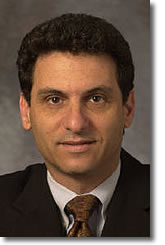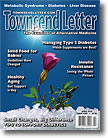|
 Is Testosterone Therapy Contraindicated in Men with Heart Disease? Is Testosterone Therapy Contraindicated in Men with Heart Disease?
At the December 2013 A4M meeting in Las Vegas, Abraham Morgentaler, MD, associate clinical professor of urology at Harvard Medical School, lectured on the use of testosterone therapy in men. His title suggested a measure of optimism: "Testosterone Therapy: Panacea, Scourge or the Next Big Thing in Medicine?" Testosterone prescriptions have surged in the last several years, due in no small part to the large advertising budgets of pharmaceutical companies. Testosterone offers improvement in sexual functioning, enhancement in lean muscle mass, and mellowing of grouchy tempers – what men would not wants these benefits? Although testosterone is restricted by the DEA, requiring a controlled prescription, doctors have been freely prescribing the hormone, which worries the critics. Too many prescriptions are being made without laboratory evaluation, presumably to men who are not testosterone deficient. The serum testosterone reference level is remarkably broad (250–1200 ng/dl); most men test "normal." However, physicians who support anti-aging medicine believe that men having testosterone deficiency symptoms with serum levels below 500 ng/dl are testosterone deficient even if the tests results lie in the normal range. Hence, the prescribing of testosterone has almost become obligatory in anti-aging clinics – what reasons are there for not prescribing testosterone? In a widely publicized PLoS One study reported on January 29, 2014, the increased risk for developing a heart attack in men with heart disease may be a contraindication for prescribing testosterone.
Morgentaler was skeptical of the study results. When interviewed by USA Today, he said, "It's possible that the men's heart attacks in this study were caused by their underlying medical problems, not by testosterone. … Most heart attacks occurred in the first 90 days after a prescription is written. It's unlikely that heart attacks could develop in such a short period of time."
A drug company, AbbVie, maker of AndroGel, stated that testosterone has been found to improve health and lower the risk of death. Long-term use of testosterone has been found to lower cholesterol, blood sugar, and blood pressure. However, a cardiologist spokesman, Steven Nissen, MD, at the Cleveland Clinic, thought that the testosterone drug manufacturers should now be obligated to conduct rigorous clinical trials to determine if testosterone increases heart risks.
The PLoS One report is not based on a clinical study; it is a statistical analysis of a large health-care database of men with and without heart disease who have been given new prescriptions of testosterone in comparison with Cialis. The authors tabulate cardiac events in the two groups through diagnostic codes found in the electronic medical records (EMR). Approximately 56,000 men were identified who were given new prescriptions of testosterone versus 167,000 men who were given new Cialis prescriptions. All men were studied to determine age, medical condition, and medications in use. Patients were separated into four groups based on being either younger or older than 65 and having heart disease or not. In each of the groups, the incidence of nonfatal heart attacks was determined for the year prior to the prescription of the drug and then for the 3-month period following the prescription of the drug. As expected, the incidence of heart attacks in the year prior to prescription of testosterone or Cialis was similar between the two groups. However, in the group treated with testosterone over age 65 who had a history of heart disease, the rate ratio (RR) of heart attack was nearly double in the testosterone group compared with the Cialis group. There was a modest increase in the RR of heart attack in the group treated with testosterone under age 65 who had a history of heart disease. In comparison, in the Cialis group there was only a modest increase in the RR of heart attack in the men with a history of heart disease both for men above and under age 65.
While the statistics for this study were robustly made with an additional arcane statistical marker known as the ratio of rate ratio (RRR), the case numbers are remarkably low. In the testosterone-treated group, 37 men developed myocardial infarcts in the year prior to receiving testosterone and 20 men developed heart attacks 3 months after being treated. In other words, this study's significance hinges on the observation that 20 men over age 65 in a group of 7000 men treated with testosterone developed an MI within 3 months. If there had only been 9 men who had developed a heart attack in this testosterone-treated group, there would have been no statistical difference – the RR and the RRR would have been identical to the Cialis-treated group. So we are talking about the difference between 20 men versus 9 men equaling 11 men, from a group of 7000 – this is the entire basis for the conclusion that testosterone treatment in men over age 65 with a history of heart disease leads to an increased risk for developing a heart attack.
In other words, 9 men of a group of 7000 would be the reason that we should begin to restrict the prescribing of testosterone to treat low testosterone and the anti-aging process. Does this make sense? We are talking about the incidence of 1 heart attack in 350 men who are over age 65 and have a history of heart disease. I don't think that 1:350 is a good justification to bar testosterone therapy.
It should also be noted that this is a study involving men using unspecified testosterone treatment – oral testosterone treatment is not metabolized well by the liver. There is no discussion about measuring testosterone levels; was testosterone being administered inadequately or excessively? Presumably, the majority of these men were under treatment with numerous medications, but minimal or no nutritional supplementation; minimal or no lifestyle, dietary, and exercise intervention; and minimal or no complementary therapies. Anti-aging physicians do not prescribe testosterone without supporting the patient fully. The chief cardiovascular concerns of testosterone prescribing are the increased risk of thrombosis presumably secondary to a relative increase in red blood cell production, and excessive metabolic breakdown of testosterone to dihydrotestosterone (DHT) and estrogen. It would be prudent for the anti-aging physician to screen and monitor patients over age 65 for heart disease. The patient should be advised of testosterone's possible increased cardiac risk. However, there is little justification to contraindicate the use of testosterone in all cardiac patients.
Morgentaler examined the 2013 JAMA study that found an increase in myocardial events and strokes in men using testosterone therapy. At the A4M Las Vegas meeting, he disputed the reported increased risk of events in the testosterone group compared with placebo. Morgentaler tallied the actual number of events in the testosterone group compared with the untreated group. The number of events in the placebo group was actually higher than in the testosterone group. Hence the conclusion of the study was wrong. Morgentaler approached the authors with his data review, and they agreed that, based on the number of events, the testosterone group did not have an increased risk for developing a cardiovascular event. However, when Morgentaler contacted JAMA, the editorial board was unwilling to retract the study. Morgentaler further noted that other studies have shown that patients with the lowest testosterone levels have the highest incidence of heart disease and mortality.
No, testosterone is not contraindicated in patients with heart disease.
Introducing Baby to Solid Foods
It has been a truism that babies should be breast-fed and not introduced to solid foods until they are at least 6 months old – even better if they are older; potentially highly allergenic foods such as peanuts, eggs, and dairy should be avoided until 1 year of age. However, such thinking may be flawed and actually contribute to the development of allergy and atopic disorders. In this issue of the Townsend Letter, Kimberly Sanders, ND, and Jacob Schor, ND, review the recent studies that have examined what happens to infants introduced to solid foods at a much earlier age – 6 months, even 4 months. The results are surprising. Many of the infants introduced to solid foods at 6 months of age or younger have a lower incidence of IgE and IgG allergy. There appears to be a "sweet spot" of delaying solid foods until 4 months, limiting the diet to only breast-feeding up to then. Introducing solid foods between 4 and 6 months of age limits the development of allergic antibodies compared with delaying introduction of solid foods to an older age.
There appears to be a remarkable parallel to the introduction of solid foods at an early age and the observation that infants exposed to "dirt" in their home environments have a lower incidence of allergenic disorders compared with children restricted to "ultraclean" environments. Pediatric studies comparing infants in poorer socioeconomic communities in Russia with infants in more affluent cities in Finland show a marked reduction in allergenic disorder. The researchers hypothesize that an early exposure to dirt, animals, and other allergens enables an adaptive response by the immune system, lessening the development of allergic disorders.
Sanders and Schor discuss how the early introduction of milk plays a role in the development of type 1 diabetes mellitus. For solid foods, it appears that introduction earlier than 4 months or later than 6 months both increased risk for developing diabetes.
Do You Think You Know All About Insulin Resistance?
Insulin resistance is just another way of talking about metabolic syndrome and prediabetes, right? That middle-aged individual with a paunch has insulin resistance, but surely that svelte younger woman couldn't, right? If the blood glucose and hemoglobin A1c are normal, then there's no need to worry about insulin resistance, right? Sorry; all of the previous statements are wrong. Individuals with metabolic syndrome are insulin resistant, but some insulin-resistant individuals don't have metabolic syndrome – for example, the trim woman might be insulin resistant. We should worry about insulin resistance even if the glucose and hemoglobin A1c are normal, because eventually insulin resistance will progress to glucose intolerance and, perhaps, diabetes.
Filomena Trindade, MD, MPH, examines in this issue the continuum of insulin resistance, glucose intolerance, prediabetes, and diabetes. Trindade's hypothesis is not for lazy patients or doctors. A fasting blood glucose of above 100 mg/dl is diagnostic for prediabetes – there are many patients and doctors whose fasting blood glucose is above 100 mg/dl. Trindade dismisses the idea that prediabetes is not a disease. She asserts that it clearly increases the risk of sustaining a cardiovascular event and developing frank diabetes. Trindade prefers the fasting blood glucose to be 87 mg/dL – the target for those who are seeking not to have glucose intolerance; ideally Trindade prefers patients to have a fasting blood glucose of 81 mg/dl and a hemoglobin A1c of 5.4%. Admittedly, these numbers are difficult to achieve – essentially impossible without a patient and doctor committed to diet, exercise, nutritional supplementation, and lifestyle changes. However, Trindade thinks that without assessing the level of insulin resistance, one cannot effectively diagnose or treat the patient. The svelte female may not have glucose intolerance or prediabetes, but she might have insulin resistance. Determining her insulin resistance may not only prevent diabetes and cardiovascular disease but also play a long-term role in preventing cancer and neurodegenerative disease.
Jonathan Collin, MD
Notes
1. Finkle, WD, Greenland S, Ridgeway, GK, et al. Increased risk of non-fatal myocardial infarction following testosterone therapy prescription in men. PLoS One. 2014; doi:10.1371/journal.pone.0085805.
2. Vigen, R, O'Donnell CI, Baron AE, et al. Association of testosterone therapy with mortality, myocardial infarction and stroke in men with low testosterone levels. JAMA. 2013;310:1829–1836.
|
![]()
![]()
![]()





 Is Testosterone Therapy Contraindicated in Men with Heart Disease?
Is Testosterone Therapy Contraindicated in Men with Heart Disease?